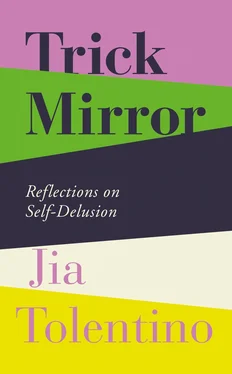In a later Awl piece, Buchanan described the chopped salad as “the perfect mid-day nutritional replenishment for the mid-level modern knowledge worker” with “neither the time nor the inclination to eat a lunch … which would require more attention than the little needed for the automatic elliptical motion of the arm from bowl to face, jaw swinging open and then clamping shut over and over until the fork comes up empty and the vessel can be deposited in the garbage can under the desk.”
On today’s terms, what he’s describing—a mechanically efficient salad-feeding session, conducted in such a way that one need not take a break from emails—is the good life. It means progress, individuation. It’s what you do when you’ve gotten ahead a little bit, when you want to get ahead some more. The hamster-wheel aspect has been self-evident for a long time now. (In 1958, the economist John Kenneth Galbraith wrote, “It can no longer be assumed that welfare is greater at an all-around higher level of production than a lower one … The higher level of production has, merely, a higher level of want creation necessitating a higher level of want satisfaction.”) But today, in an economy defined by precarity, more of what was merely stupid and adaptive has turned stupid and compulsory. Vulnerability, which is ever present, must be warded off at all costs. And so I go to Sweetgreen on days when I need to eat vegetables very quickly because I’ve been working till one A.M. all week and don’t have time to make dinner because I have to work till one A.M. again, and like a chump, I try to make eye contact across the sneeze guard, as if this alleviated anything about the skyrocketing productivity requirements that have forced these two lines of people to scarf and create kale Caesars all day, and then I “grab” my salad and eat it in under ten minutes while looking at email and on the train home remind myself that next time, for points purposes, I should probably buy the salad through the salad’s designated app.
It’s very easy, under conditions of artificial but continually escalating obligation, to find yourself organizing your life around practices you find ridiculous and possibly indefensible. Women have known this intimately for a long time.
I was a late bloomer in terms of functional physical practices, like eating vegetables and exercising. I didn’t start doing either thing with any conviction—or without the baggage of ambiently disordered female adolescence—until I joined the Peace Corps, when I was twenty-one. I was a gymnast as a kid and then a cheerleader later, but one thing was fun and the second was effectively a requirement: at my school, you had to play a sport, and I lacked the athletic ability or competitive instinct to do anything else. As a teenager, I subsisted on pizza and queso and cinnamon rolls, trying to immunize myself with apathy and pleasure-seeking throughout the long stretch of time when girls, overwhelmed by sudden expectations of beauty, transmit anorexia and bulimia to one another like a virus. In high school, as I recount in my journal, other girls on the cheerleading squad would chastise me for eating carbs after sundown; a guy who had an obvious crush on me often expressed it by telling me I was gaining weight. (“Who cares, I’m going to go downstairs and eat a huge breakfast, bitch,” I wrote to him on AIM one morning.) I had avoided the hang-ups that seemed to be endemic, but anytime my friends talked about diets or exercise, I could still feel a compulsive strain prickling to life within me, a sudden desire to skip a meal and do sit-ups. To avoid it, I avoided the gym, and kept eating like a stoner: I had come to understand health as discipline, discipline as punitive, and punitive as a concept that would send me down a rabbit hole of calorie math and vomit. For the better part of a decade, I figured I was better off being slightly unhealthy and leaving the active pursuit of body-related matters alone.
This all changed once I joined the Peace Corps, where it was impossible to think too much about my appearance, and where health was of such immediate importance that it was always on my mind. I developed active tuberculosis while volunteering and, for some stress- or nutrition-related reason, started to shed my thick black hair. I realized how much I had taken my functional body for granted. I lived in a mile-long village in the middle of a western province in Kyrgyzstan: there were larch trees on the snowy mountains, flocks of sheep crossing dusty roads, but there was no running water, no grocery store. The resourceful villagers preserved peppers and tomatoes, stockpiled apples and onions, but it was so difficult to get fresh produce otherwise that I regularly fantasized about spinach and oranges, and would spend entire weekends trying to obtain them. As a prophylactic measure against mental breakdown, I started doing yoga in my room every day. Exercise, I thought. What a miracle! After Peace Corps, I kept at it. I was back in Houston, I had a lot of spare time, and I spent it at midday yoga classes at expensive studios to which I would buy discounted first-time packages and never return.
This period, around 2011, reintroduced me to the world of American abundance. The first time I went into a grocery store and saw how many different fruits there were, I cried. At these yoga classes, I marveled at the fanatic high functionality of the women around me. They carried red totes covered with terrifying slogans (“The perfect tombstone would read ‘All used up’”; “Children are the orgasm of life”) and they talked about “luncheons” and microdermabrasion and four-hundred-person wedding guest lists. They purchased $90 leggings in the waiting room after class. I was not, at the time, on their level: I had been taking giardia shits in a backyard outhouse for a year straight, and I was flooded with dread and spiritual uselessness, the sense that I had failed myself and others, the fear that I would never again be useful to another human being. In this context, it felt both bad and wonderfully anesthetizing to do yoga around these women. In the hundred-degree heat I would lie back for corpse pose, sweat soaking my cheap mat from Target, and sometimes, as I fluttered my eyes shut, I would catch the twinkle of enormous diamond rings caught in shafts of sunbeam, blinking at me in the temporary darkness like a fleet of indoor stars.
In 2012, I moved to Ann Arbor for an MFA program. Classes started in the fall, but we packed up in early summer. My boyfriend, who’d just finished grad school, needed to look for a job. In our little blue house in Michigan, I tinkered with some of my somber and ponderous short stories, unsure if this would feel different once I had formal guidance. I met up with my soon-to-be classmates and drank big sour beers and talked about Train Dreams and Lorrie Moore. Mostly I drifted around the lovely college town in what I accurately sensed would be my last stretch of true aimlessness for a long time. I walked my dog, looked at fireflies, went to yoga. One day, I was at a studio on the west side of town when a woman next to me queefed a thick, wet queef while sinking deep into Warrior II. I held back my laughter. She kept queefing, and kept queefing, and queefed and queefed and queefed. Over the course of the hour, as she continued queefing, my emotions went fractal—hysterical amusement and unplaceable panic combining and recombining in a kaleidoscopic blur. By the time we hit final resting pose, my heart was racing. I heard the queefing woman get up and leave the room. When she returned, I peeked an eye open to look at her. Clothed, disturbingly, in a different pair of pants, she lay down next to me and sighed, satisfied. Then, with a serene smile on her face, she queefed one more time.
At that moment, my soul having been flayed by secondhand vaginal exhalation, I wanted nothing more than to jump out of my skin. I wanted to land in a new life where everything—bodies, ambitions—would work seamlessly and efficiently. Trapped in corpse pose, in a motionlessness that was supposed to be relaxing, I felt the specter of stagnation hovering over my existence. I missed, suddenly, the part of me that thrilled to sharpness, harshness, discipline. I had directed these instincts at my mind, kept them away from my body, but why? I needed a break from yoga, which had reminded me, just then, of how I’d felt all throughout Peace Corps—as if I didn’t know what I was doing, and never would.
Читать дальше












